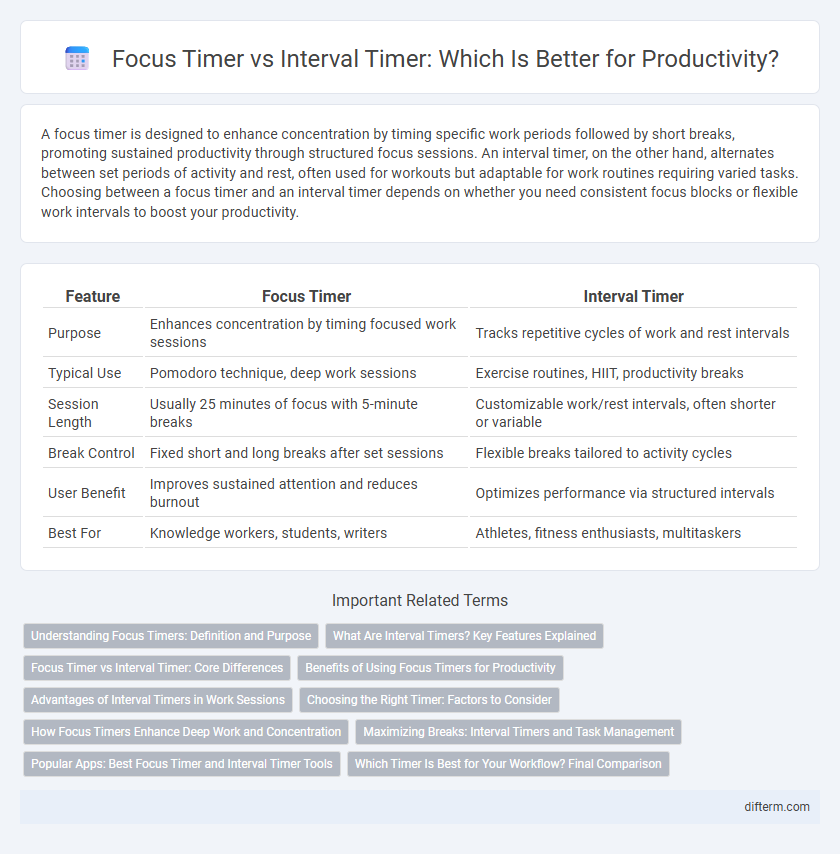A focus timer is designed to enhance concentration by timing specific work periods followed by short breaks, promoting sustained productivity through structured focus sessions. An interval timer, on the other hand, alternates between set periods of activity and rest, often used for workouts but adaptable for work routines requiring varied tasks. Choosing between a focus timer and an interval timer depends on whether you need consistent focus blocks or flexible work intervals to boost your productivity.
Table of Comparison
| Feature | Focus Timer | Interval Timer |
|---|---|---|
| Purpose | Enhances concentration by timing focused work sessions | Tracks repetitive cycles of work and rest intervals |
| Typical Use | Pomodoro technique, deep work sessions | Exercise routines, HIIT, productivity breaks |
| Session Length | Usually 25 minutes of focus with 5-minute breaks | Customizable work/rest intervals, often shorter or variable |
| Break Control | Fixed short and long breaks after set sessions | Flexible breaks tailored to activity cycles |
| User Benefit | Improves sustained attention and reduces burnout | Optimizes performance via structured intervals |
| Best For | Knowledge workers, students, writers | Athletes, fitness enthusiasts, multitaskers |
Understanding Focus Timers: Definition and Purpose
Focus timers are specialized tools designed to enhance productivity by segmenting work into dedicated intervals, typically aligned with techniques such as the Pomodoro Method. Unlike general interval timers that merely count down fixed periods, focus timers incorporate structured work and break cycles to optimize mental concentration and prevent burnout. These timers help users maintain sustained attention on tasks by promoting consistent pacing and regular rest, thereby improving overall focus and efficiency.
What Are Interval Timers? Key Features Explained
Interval timers are customizable tools designed to alternate between specific periods of work and rest, enhancing productivity through structured time management. Key features include adjustable intervals, auditory or visual alerts signaling transitions, and the ability to create repetitive cycles tailored to tasks such as exercise, study sessions, or focused work periods. These timers optimize focus by promoting concentrated effort during work intervals and essential breaks, reducing burnout and increasing overall efficiency.
Focus Timer vs Interval Timer: Core Differences
Focus timers are designed to enhance concentration by setting fixed work periods followed by short breaks, aligning with techniques like Pomodoro to improve productivity. Interval timers provide customizable time segments for various activities, often used in workouts but applicable to work tasks requiring varying work and rest durations. The core difference lies in focus timers enforcing consistent cycles to maintain sustained attention while interval timers offer flexibility for diverse time management needs.
Benefits of Using Focus Timers for Productivity
Focus timers enhance productivity by creating structured work sessions that encourage sustained concentration and minimize distractions. By breaking tasks into manageable intervals, they help maintain mental clarity and prevent burnout, leading to improved efficiency and task completion rates. Incorporating focus timers supports consistent time management habits and fosters accountability in both professional and personal work environments.
Advantages of Interval Timers in Work Sessions
Interval timers enhance productivity by structuring work sessions into manageable segments, promoting consistent focus and regular breaks. This method reduces mental fatigue and maintains high energy levels throughout the workday. Research shows that interval timing improves task completion rates and cognitive performance compared to traditional focus timers.
Choosing the Right Timer: Factors to Consider
Choosing the right timer involves evaluating your work rhythm and task complexity to maximize productivity. A focus timer, such as the Pomodoro Technique, suits tasks requiring sustained concentration with regular breaks, enhancing mental stamina. Interval timers work best for varied activities needing flexible timing, supporting diverse work patterns and maintaining motivation.
How Focus Timers Enhance Deep Work and Concentration
Focus timers enhance deep work and concentration by structuring uninterrupted work periods, which reduces cognitive switching costs and mental fatigue. These timers promote sustained attention through predefined intervals aligned with natural attention spans, enabling users to enter flow states more effectively than generic interval timers. Evidence from cognitive psychology shows that focus timers improve task engagement and productivity by minimizing distractions and reinforcing disciplined work habits.
Maximizing Breaks: Interval Timers and Task Management
Interval timers enhance productivity by structuring work into designated periods alternated with frequent breaks, optimizing mental rejuvenation and preventing burnout. Unlike focus timers that emphasize extended concentration, interval timers strategically maximize breaks to improve task management efficiency and sustain high performance throughout the day. Leveraging interval timers facilitates better prioritization and completion of complex tasks by balancing work efforts with restorative pauses.
Popular Apps: Best Focus Timer and Interval Timer Tools
Popular productivity apps like Forest and Pomodoro Timer excel as focus timers by using the Pomodoro Technique to enhance concentration through timed work sessions and breaks. Interval timer apps such as Interval Timer and Seconds focus on customizable workout or task intervals, providing flexibility for varied task durations and intensity levels. Selecting between focus timers and interval timers depends on the work style, with focus timers best for sustained concentration and interval timers ideal for repetitive or cyclical tasks.
Which Timer Is Best for Your Workflow? Final Comparison
Focus timers, designed to enhance concentration during specific tasks, offer customizable durations aligned with productivity techniques like the Pomodoro method, promoting sustained attention and reduced burnout. Interval timers, often used for physical training or varied activity routines, are less tailored to cognitive work but can help segment different work phases or breaks effectively. Choosing the best timer for your workflow depends on the nature of your tasks; focus timers suit prolonged, deep work sessions, while interval timers support workflows requiring alternating intensities or multitasking.
focus timer vs interval timer Infographic

 difterm.com
difterm.com